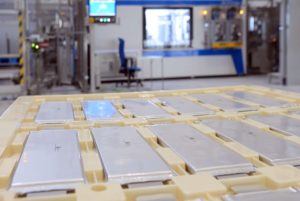In a move totally out of touch with what is happening in the world, President Joe Biden’s Department of Energy (DOE) provided a $200 million grant to a Texas-based battery technology company that generates most of its revenue in China. The trend in the United States has been away from doing business with Beijing, but Energy Secretary Jennifer Granholm apparently didn’t get the memo. Lithium batteries are perhaps the most ubiquitous electronic component providing power for Americans’ daily lives and military combat capability.
“In October, the Department of Energy awarded the grant to Microvast, a Texas-based maker of technology for electric vehicle batteries, under the $1 trillion infrastructure package President Biden signed into law in November 2021,” Thomas Catenacci wrote for Fox News. That legislation was designed to “deliver thousands of electric school buses nationwide, including rural communities, to help school districts across the country buy clean American-made, zero-emission buses,” according to a White House press release, which carefully did not mention that in some cases American taxes would be applied to further the economic objectives of the People’s Republic of China (PRC). Catenacci noted:
“However, 69% of Microvast’s revenue was generated in China and just 3% came from the US, according to a third quarter financial disclosure it filed with the Securities and Exchange Commission (SEC) [in November]. In the same filing, the company acknowledged that the Chinese government ‘exerts substantial influence’ over its business activities and ‘may intervene at any time and with no notice.’”
The DOE had plenty of time to vet Microvast to understand the company’s strong ties to the Chinese Communist Party (CCP) and the influence Beijing wields.
Biden’s DOE Had Information China Was Involved
Furthermore, the Biden administration had enough information to question the Microvast application for the nearly quarter-billion-dollar grant. “The Biden appointees knew from the outset that because of China’s aggressiveness in infiltrating US energy and high-tech companies they were going to need to be extra vigilant about where these [infrastructure] funds went,” a former DOE official told The Washington Free Beacon. So, why wasn’t the energy department concerned about this? More perplexing is why the administration is investing taxpayer dollars to further the financial fortunes of Beijing-controlled businesses in the United States.
Announcing the Creating Helpful Incentives to Produce Semiconductors for America, or CHIPS for America Act, a White House statement boasted that CHIPS funds “also come with strong guardrails, ensuring that recipients do not establish certain facilities in China and other countries of concern … ” Yet within the last several weeks, Biden has hit the road to extol his administration’s desire to build high-tech products in the United States, part of its “reshoring” campaign to bring back domestic microelectronics manufacturing. What appears to be conflicting agendas for the Biden team is not new. The late former chairman of the Joint Chiefs of Staff, Admiral William J. Crowe, was fond of saying about such double-speak: “It appears once again this is a case of the right hand not knowing what the right hand is doing.”

(Photo by Soeren Stache/picture alliance via Getty Images)
China Working Hard to Penetrate US Supply Chain
China has made a concerted effort to become part of the US supply chain for crucial industries, a continuing problem that is a growing national security issue. Pentagon officials spend significant resources to ferret out potential counterfeit Chinese parts and raw materials. “Amid China’s rise as a military rival to the United States and its status as the origin of much counterfeiting in the world, officials and experts say its’s a growing concern,” Defense News reported.
So why would the Biden energy department not err on the side of caution and provide grants only to wholly American companies? Why invest US taxpayer dollars in a company backed by a military and economic rival working against the interests of those very taxpayers? The poorly researched grant to Microvast demonstrates a naïve understanding of the CCP’s objective to insinuate itself into as many institutions of American daily life and as much critical infrastructure as possible. The CHIPS Act was perhaps a step in the right direction. Funding Microvast was not.
The views expressed are those of the author and not of any other affiliation.
Do you have an opinion about this article? We’d love to hear it! If you send your comments to [email protected], we might even publish your edited remarks in our new feature, LN Readers Speak Out. Remember to include the URL of the article along with your name, city, and state.
Please respect our republishing guidelines. Republication permission does not equal site endorsement. Click here.





















